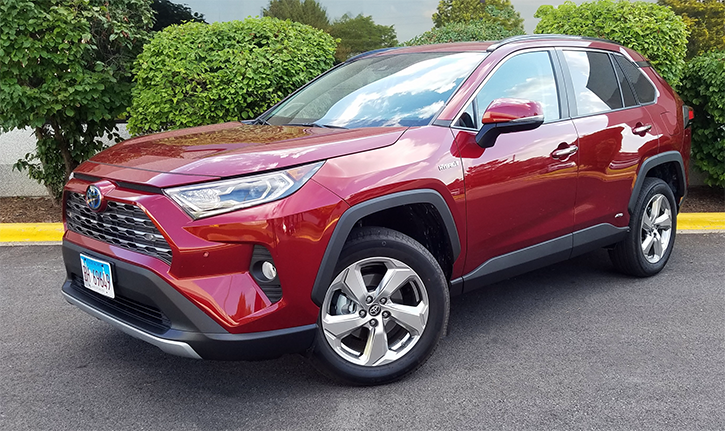
 2019 Toyota RAV4 Hybrid Limited AWD
2019 Toyota RAV4 Hybrid Limited AWD
Class: Compact Crossover
Miles driven: 1060
Fuel used: 26.3 gallons
Real-world fuel economy: 40.3 mpg
| CG Report Card | |
|---|---|
| Room and Comfort | B+ |
| Power and Performance | B+ |
| Fit and Finish | B- |
| Fuel Economy | A |
| Value | A |
| Report-card grades are derived from a consensus of test-driver evaluations. All grades are versus other vehicles in the same class. Value grade is for specific trim level evaluated, and may not reflect Consumer Guide's impressions of the entire model lineup. | |
| Big & Tall Comfort | |
| Big Guy | B- |
| Tall Guy | B- |
| Big & Tall comfort ratings are for front seats only. "Big" rating based on male tester weighing approximately 350 pounds, "Tall" rating based on 6'6"-tall male tester. | |
| Drivetrain | |
| Engine Specs | 219-hp 2.5L |
| Engine Type | 4-cylinder hybrid |
| Transmission | CVT automatic |
| Drive Wheels | All-wheel drive |
Driving mix: 20% city, 80% highway
EPA-estimated fuel economy: 41/38/40 (city, highway, combined)
Fuel type: Regular gas
Base price: $35,700 (not including $1095 destination charge)
Options on test vehicle: Limited-Grade Weather Package ($1015), Entune 3.0 Premium Audio with Dynamic Navigation package ($580), Limited-Grade Advanced Technology Package ($1025), adaptive front headlight system ($415), special color ($395), carpet floor mats/cargo mat ($269), door-edge guard ($140), door-sill protector ($199)
Price as tested: $40,833
Quick Hits
The great: Fuel economy, cargo capacity, lots of high-tech features
The good: Acceleration, road manners, control layout
The not so good: Limited front headroom for taller folks
More RAV4 price and availability information
CG Says:
Hybrids were originally conceived as fuel-economy champs, Toyota’s Prius being one of the first — and most famous — to hit the market. And while it indeed returned stellar mileage for the time, a hot rod it was not.
But hybrids aren’t just for fuel economy anymore.
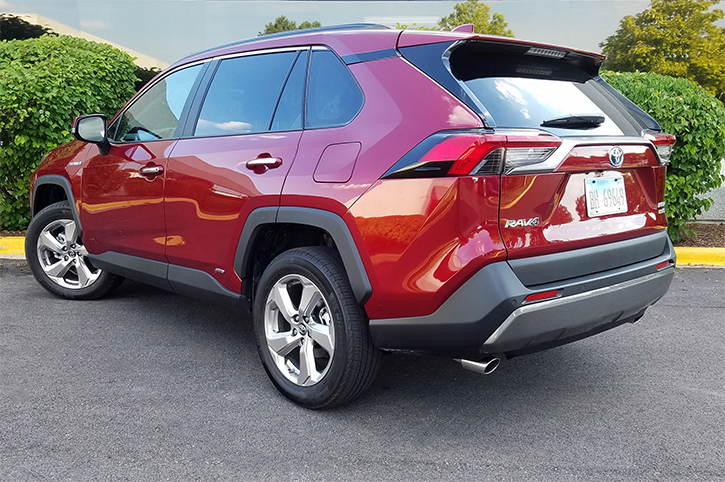
One of the beauties of combining gas and electric power is that they complement each other so well. Whereas gas engines have to “rev up” to build power, electric motors produce as much as they’re going to as soon as they start to turn, with that power dropping off at higher rotational speeds. So they sort of fill in each others’ gaps. Combined in the right way, they can produce an even flow of strong acceleration.
And that’s the case with the Toyota RAV4 Hybrid.

While gas versions of the RAV4 have a lot going for them – as evidenced by our test of a top-line Limited trim level earlier this year – a Hybrid version driven recently proved even better. Not only was fuel economy up, but it was also quick. It returned 40.3 mpg vs. 25.5 mpg for the gas RAV4 in similar driving – an increase of 60 percent – and averaged the 0-60 dash in a good-for-the-class 7.5 seconds. Furthermore, that came with a strong full-throttle jump off the line and fine kickdown response when hitting the throttle at speed. Combine that with a comfortable ride and decent handling, and the RAV4 Hybrid Limited impressed with fine overall dynamics. And its base price was just $800 more than that of the gas AWD Limited (the Hybrid comes standard with AWD), making it somewhat of a bargain.
First Look: 2020 Honda CR-V Hybrid
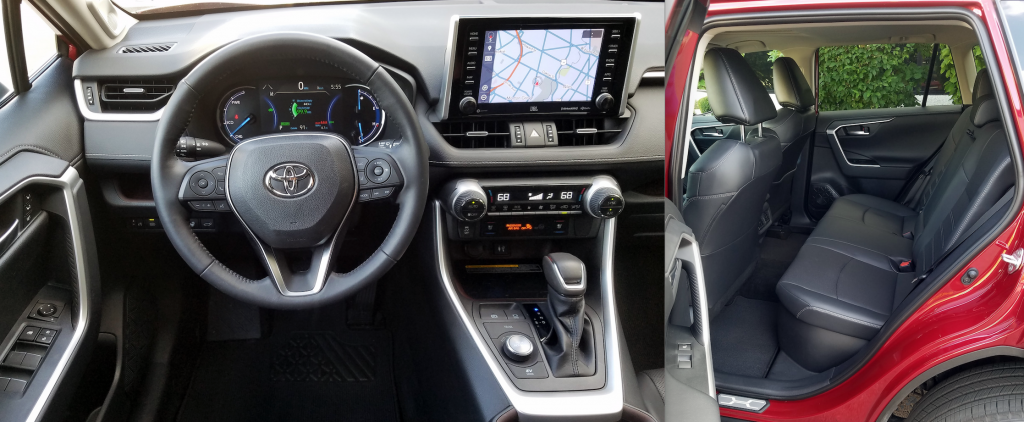
In other ways, our test Hybrid reflected the goodness – and limitations – of its gas counterpart. The former includes forward visibility, control layout, legroom, cabin-storage space, and cargo room; the latter, limited headroom for tall folks, particularly in the front seats. But a few features stood out to me.
Test Drive: 2019 Subaru Forester Touring

Not only is the radio nicely arranged and easy to use, ours included a Replay button that allows you to “rewind” to the beginning of a song playing, and in fact, back to the last time the radio was turned on. So that favorite song can be repeated over and over again … something that’s admittedly not always a benefit in the eyes of passengers.
Another was an Auto function on the 360-degree camera that – when selected – would automatically turn on the front and 360-degree cameras as you came to a stop, even showing the curb – which is particularly useful if that “stop” is at the end of an alley or a prelude to parking at the side of a street. While neither of these features are exclusive to the RAV4, they’re not commonly found in competitors — at least, not yet.
Quick Spin: 2019 Nissan Rogue Sport SL
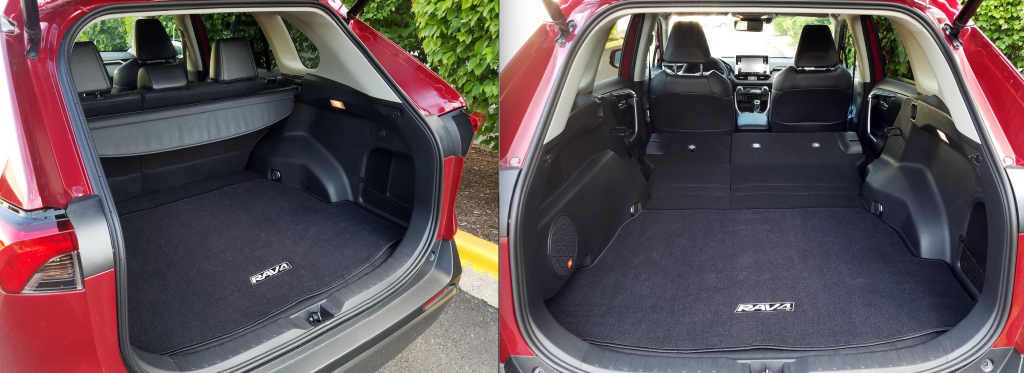
On RAV4 Hybrids, the AWD system is different than on gas models. In the Hybrid, the rear wheels are driven by an electric motor, so – unlike in the gas model’s AWD system – there’s no driveshaft running from the front axle to the rear through the center of the vehicle. Since the rear motor is powered by a relatively limited-capacity battery, the rear wheels are only driven under acceleration or when slip at the front wheels is detected.
Test Drive: 2019 GMC Terrain SLT
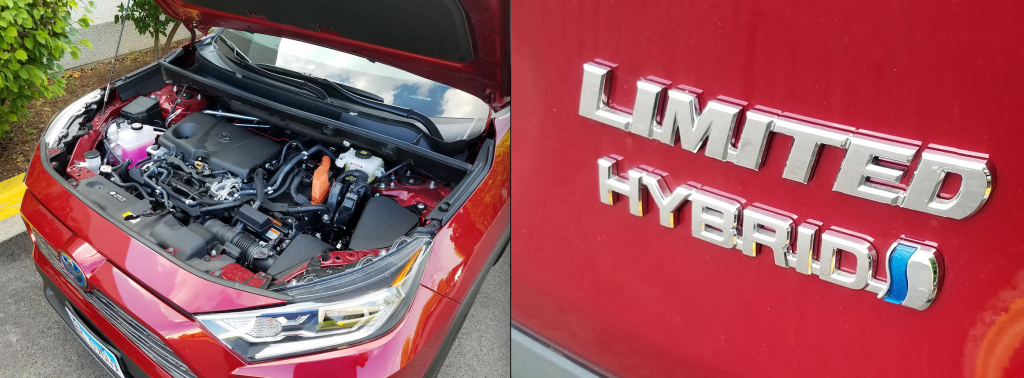
Although RAV4 Hybrids start at $29,220 for the base LE model — $850 more than for the gas AWD version and $2250 more than for the gas front-drive version – we feel that’s money well spent … even if you don’t need AWD. Because the Hybrid version of the RAV4 really stands out in the compact-crossover class for not only its stellar fuel economy and overall goodness, but also for its instant-access power.
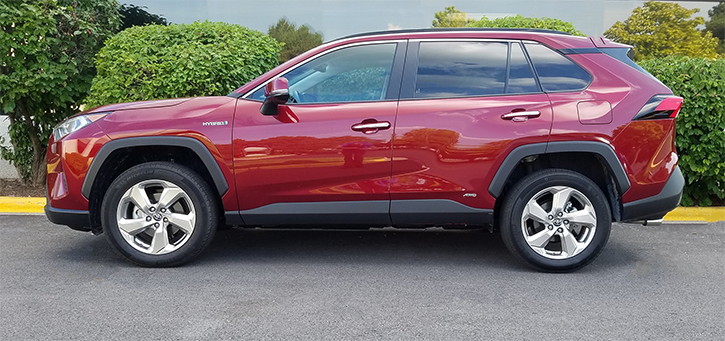
Test Drive: 2019 Mazda CX-5 Signature
Check out our Compact Crossover Best Buys
Consumer Guide Car Stuff Podcast, Episode 41: 2020 Jeep Gladiator Mojave, Safe Vehicles for Teens
2019 Toyota RAV4 Hybrid


